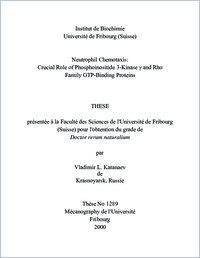Neutrophil chemotaxis : crucial role of phosphoinositide 3-kinase γ and Rho family GTP-binding proteins
- Katanaev, Vladimir L
- Wymann, Matthias P. (Degree supervisor)
- Way, Michael (Degree supervisor)
- Niggli, Verena (Degree supervisor)
-
25.01.2000
137 p
Thèse de doctorat: Université de Fribourg, 2000
English
French
Neutrophils represent a key component of organism's innate immunity. They are able to sense bacterial infection, migrate to its source, and destroy the invading pathogen. The vast array of neutrophil activities is controlled by an elaborated net of signal transduction cascades, linking surface receptors with the cell interior and regulating cell responses to the extracellular milieu. Chemoattractants like fMLP or interleukin-8 activate neutrophil receptors coupled to trimeric G proteins. The latter signal to phosphoinositide 3-kinase γ (PI3Kγ), an enzyme phosphorylating D3-position of PIP2 and also possessing a protein kinase activity. To elucidate the role of PI3Kγ in neutrophil signalling, we analyzed neutrophil functions in PI3Kγ knock-out mice. Several responses to chemoattractants were impaired in PI3Kγ -/- neutrophils. After priming with lipopolysaccharide, wild type but not knock-out neutrophils responded to fMLP with a production of oxygen radicals. Chemoattractant-induced cell adhesion and actin polymerization were reduced in PI3Kγ- null neutrophils. Finally, chemotaxis of neutrophils in vitro and in vivo was impaired, resulting in reduced protection of PI3Kγ knock-out mice from infecting bacteria. These data demonstrate a crucial role of PI3Kγ in neutrophil responses in inflammation. They also put forward the enzyme as a promising target for the development of antiinflammatory drugs. Regulated in time and space rearrangements of actin cytoskeleton are crucial to exert such cell activities as chemotaxis, adhesion, and phagocytosis. To characterize biochemically signalling to actin polymerization, we designed a cell-free system from the cytosol of human neutrophils. In this system addition of GTPγS, a non-hydrolyzable analogue of GTP, induced massive actin polymerization and cross-linking. This effect was due to constitutive activation of small Rho family GTP-binding proteins, proving their role in the control of neutrophil actin cytoskeleton. Rho-protein induced actin polymerization was shown to require a plasma membrane-associated guanine nucleotide exchange factor(s). It was also shown to be exerted via a kinase-independent mechanism, excluding a multitude of proposed downstream targets of Rho proteins in the induction of actin polymerization in the neutrophil cytosol. We suggested that Rac and Cdc42 could not be the proteins mediating the effect of GTPγS. In contrast, we found that Rho and a CIP4-binding protein could initiate actin polymerization. These data are an important contribution to the molecular dissecting of cell signalling to actin cytoskeleton, and the established cell-free system will provide more insights into the mechanisms of cell activation.
Des neutrophiles représentent le composant principal de l'immunité innée des organismes. Ils sont capables détecter des infections bactériennes, de migrer vers ces dernières afin de détruire les pathogènes envahisseurs. La vaste palette des activités des neutrophiles est contrôlée par un réseau élaboré de cascades de signalisation, qui lient des récepteurs de la surface avec l'intérieur des cellules régulant ainsi les réponses cellulaires au milieu environnant. Des agents chimiotactiques comme le fMLP ou l'interleukin-8 agissent sur les neutrophiles par l'intermédiaire de récepteurs liés aux protéines G trimériques capable d'activer la phosphoinositide 3-kinase de type γ (PI3Kγ), enzyme phosphorylant la position D3 du PIP2 et possédant une activité protéine kinase. Pour élucider le rôle de PI3Kγ dans la signalisation des neutrophiles, nous avons utilisé des souris délétées du gène codant pour la PI3Kγ (PI3Kγ -/-). Nous avons pu montré une diminution des réponses des neutrophiles PI3Kγ-/- à des agents chimiotactiques. En effet, après un "priming" avec du lipopolysaccharide, la production de radicaux oxygénés induite par le fMLP était abolie. Après induction par des agents chimiotactiques, l'adhésion et la polymérisation d'actine des neutrophiles PI3Kγ-/- étaient réduites. Enfin, le chimiotactisme des neutrophiles in vitro et in vivo était diminué, induisant ainsi une protection réduite des souris PI3Kγ -/- contre l'infection bactérienne. Ces données montrent un rôle crucial de la PI3Kγ dans les réponses inflammatoires des neutrophiles et ouvrent des perspectives quant au développement de nouvelles drogues ayant pour cible la PI3Kγ . Les réarrangements du cytosquelette d'actine sont des évènements indispensables pour des activités cellulaires comme le chimiotactisme, l'adhésion, et la phagocytose. Pour caractériser biochimiquement la signalisation conduisant à la polymérisation d'actine, nous avons mis au point un système in vitro utilisant le cytoplasme de neutrophiles humains dans lequel l'ajout de GTPγS (analogue non hydrolysable du GTP) induisait la polymérisation et la formation de réseaux d'actine. Nous avons pu montré que cet effet dépendait de l'activation des petites protéines G de la famille Rho, elle-même sous le contrôle de facteurs d'échanges nucléotidiques (GEF) membranaires, montrant ainsi leur rôle dans le contrôle du cytosquelette d'actine des neutrophiles. De façon surprenante, cette signalisation est indépendante de kinases, excluant l'implication de nombreuses cibles des protéines Rho dans l'initiation de la polymérisation d'actine. Nous avons suggéré que l'effet du GTPγS n'était pas induit par Rac et Cdc42, mais par Rho et une protéine liée à CIP4. L'ensemble de ces données ainsi que la mise au point d'un système in vitro, contribuent à une meilleure compréhension des mécanismes moléculaires impliqués dans la signalisation conduisant au cytosquelette d'actine.
- Faculty
- Faculté des sciences et de médecine
- Language
-
- English
- Classification
- Biological sciences
- License
-
License undefined
- Identifiers
-
- RERO DOC 5043
- URN urn:nbn:ch:rero-002-101894
- RERO R268695460
- Persistent URL
- https://folia.unifr.ch/unifr/documents/299859
Statistics
Document views: 271
File downloads:
- Texte intégral: 216
